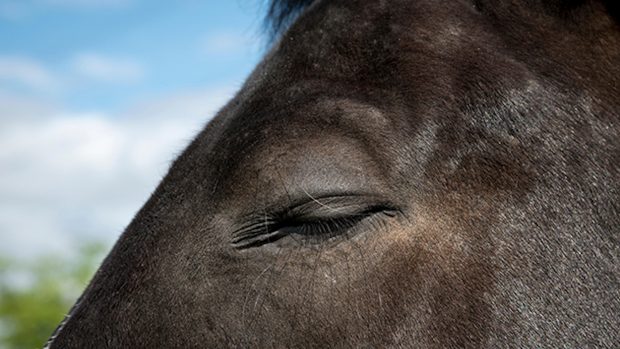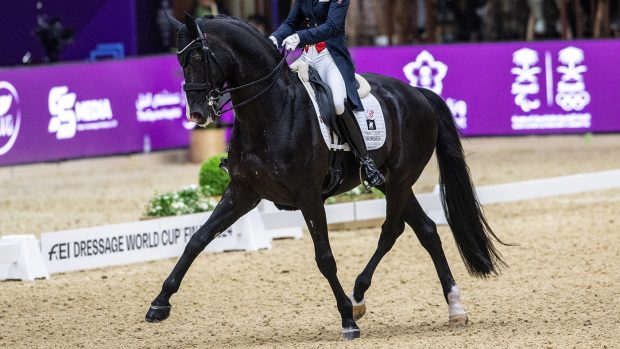In the week we invite you to nominate your veterinary hero for the Baileys Horse Feeds Vet of the Year, we take a look at some rather unusual circumstances faced by equine vets...
1. ‘You will have to seduce her’
“I do a lot of equine dentistry and I remember attending to a mare owned by a Swedish lady who had recently moved to Devon and was struggling a little with her English. The lady said: ‘You will have to seduce her.’ I think the word she was looking for was sedate! Needless to say I managed to rasp the teeth without any seduction or sedation.” — David Rowlands MRCVS of Penbode Equine Vets in Devon
2. ‘I lost the bottom of my oil sump’
“I once advised a client that it wouldn’t be a problem to vaccinate her horse in its field. She said it was down a farm track but there was no need for a 4×4. I made it to the end, but lost the bottom of my oil sump and all of my van’s oil in the process. Fortunately my next client was understanding enough to pick me up and drive me around for the rest of the day while my van was in the garage.” — Imogen Burrows MRCVS of Cliffe Equine Clinic, East Sussex
3. ‘She been impaled in her axilla’
“A large Percheron mare came into the clinic with a significant stake wound. She had careered through a fence with metal posts and been impaled in her axilla, with about eight inches of it protruding behind her elbow. We were very concerned about the location of the post because it could have been close to the heart, the lungs or any number of important blood vessels and nerves. The mare was in shock, with a high heart rate and pale mucus membranes, very lame and shaking. But when we tried to sedate her, the moment the needle touched her skin she flipped out, practically rearing over backwards and careering through the door of the exam room and into the corridor. Our hearts sank — we couldn’t imagine what damage she might have done to her insides. I peered around the corner to see a bewildered, giant horse looking back at me and a metal fence post lying on the floor. It had simply fallen out and not caused any trouble whatsoever.” — Phil Cramp, Hambleton Equine Clinic, North Yorkshire
Continued below…
Nominate your vet for the Baileys Horse Feeds Vet of the Year 2020
This has been an extraordinary year, with so much changing in the face of Covid-19. But we are thrilled to announce the H&H Awards, again in partnership with NAF, are back, and nominations are now open. One of the categories is the Baileys Horse Feeds Vet of the Year 2020. We are looking for an outstanding vet who has made a real difference to the horses in his or her care in 2020, and subsequently has had a positive impact on the lives of their owners, too, for which they cannot thank them enough. If you have a vet that you would like to nominate for this award, put them forward here.

Remarkable vet stories: ‘It’s incredibly rare and goes against everything I’ve experienced’

Subscribe to Horse & Hound this spring for great savings
4. ‘Her mare was being attacked by a deer’
“A panicked client once called me at 5am. She was distressed because she had looked out of her bedroom window and noticed that her mare, who was turned out in a field in the distance, was being attacked by a deer. Apparently it was head-butting her repeatedly. I rushed out to the scene and found a newborn foal!” — Peter Green MRCVS, Torch Equine Vets, Devon
5. ‘The girth ended up around the abdomen like a bucking bronco cinch’
“As a former competition rider I sometimes ride horses as part of their clinical assessment, because I can often feel more than I can see in horses with a history of poor performance rather than overt lameness. One horse had been working well but suddenly reared up — almost completely vertical — and the saddle slipped back. The girth ended up around the abdomen like a bucking bronco cinch and the result was a rodeo act ending in me sitting on the ground.” — Dr Sue Dyson, Animal Health Trust, Suffolk
6. ‘At this crucial point I heard a thud in the background’
“I was carrying out a standing castration on a two-year-old colt owned by two traditional horsemen in Northumberland. I made an incision and with the first testicle exteriorised I was ready to emasculate and remove it. At this crucial point I heard a thud in the background. Not wanting to take my eyes off the job in hand I asked: “What’s happening?”
“He’s gone,” said one of the owners.
“What do you mean he’s gone?”
“He’s fainted and I’m worried about his heart condition.”
“Don’t you think you should phone for an ambulance?”
I glanced between the colt’s legs to see the second owner lying on the floor, his face grey and sweaty. Paramedics arrived at the stable door just as I was making an incision into the second testicle.
“He’s at the front of the horse. I won’t be long but come in and see him,” I said.
The paramedics filed past my patient to assess their own, who was now groaning and starting to come round. He was taken out on a stretcher and I heard the two male paramedics mutter something about keeping their knees together until they got out of the stable. The sedated horse was totally unaware of the drama around him and the procedure, although surreal, went well. The owner was fitted with a pacemaker and recovered.”
Lesley Barwise-Munro, Alnorthumbria Veterinary Group, Northumberland
Horse & Hound magazine, out every Thursday, is packed with all the latest news and reports, as well as interviews, specials, nostalgia, vet and training advice. Find how you can enjoy the magazine delivered to your door every week, plus options to upgrade to access our H&H Plus online service which brings you breaking news as it happens as well as other benefits.





